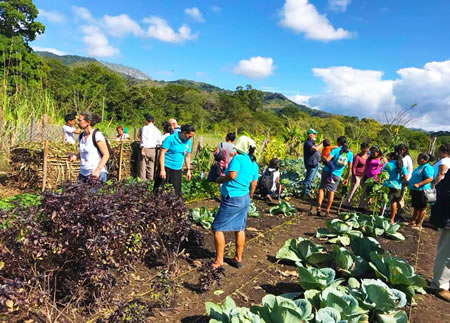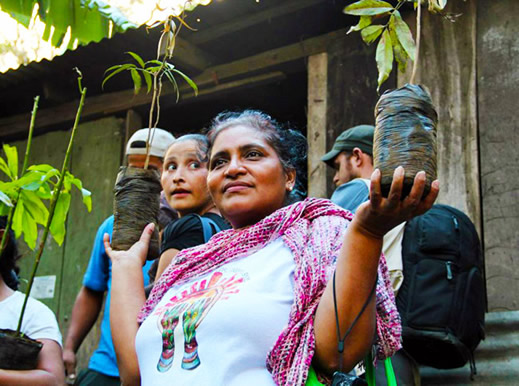The Growing Edge: Biointensive Thriving in Nicaragua Of all the places in the world where the GROW BIOINTENSIVE method (GB) is being used, it is spreading rapidly in Mexico and Latin America and—most of all—in Nicaragua. By the end of 2018 there will be over 100 certified trainers at all levels in Mexico, South America, Central America and the Caribbean—with 85 of them in Nicaragua! From January 22 to 26, 2018, ECOPOL, Ecology Action's International Partner in Latin America, co-sponsored a five-day GB conference in Nicaragua, with 20 participants from Bolivia, Chile, Peru, El Salvador, Honduras, Mexico, France, Italy and Spain. On the first day, which was for presentations at the National Agrarian University (UNA)—a co-sponsor of the event where the conference took place—there were over 100 attendees. Juan Manuel Martinez, head of ECOPOL, who organized the conference, estimates there were about 400 Nicaraguans who participated in activities during the week. Lilia Splender, the CEO of Amigos de la Tierra/Friends of the Earth-Spain, was one of the participants. Her organization is going to publish 5,000 copies of How to Grow More Vegetables (8th edition) in Spanish for Central America. Others interested in the conference streamed the event live on Facebook, allowing it to be viewed elsewhere in Nicaragua and worldwide. The energy level was very high! As a result of the conference and the GB work being accomplished in Nicaragua, HBO is planning to film a program on the GB method in the country in 2019. Ecology Action's Director John Jeavons and Advanced-Level GB Certified Teacher and VGFP Mini-Farm Manager Matt Drewno made presentations at the conference. Matt spoke on Achieving More with Less: Experiments in Growing a Complete Diet in 1,000 Square Feet and John's topic was Food for the Future: Now. John and Juan Manuel were both awarded beautiful certificates at the final celebration dinner—each for his life of humanitarian work. After he and Matt returned home, John had many things to report from the conference and his time in Nicaragua. He believes that the GB program there can be viewed as a microcosm of what can, and possibly should, be done—a living example of a proactive, nurturing and healthful farming and gardening system. Examples of the work there include:
At the conference both men and women's GB mini-farming projects were represented, with both groups doing well. In addition, one of the highlights of the conference was the introduction to two strong women's groups who have incorporated the GB method into their organizations:
Continue to page: 1 | 2 top | Newsletter Home | Table of Contents | Archive
. |




